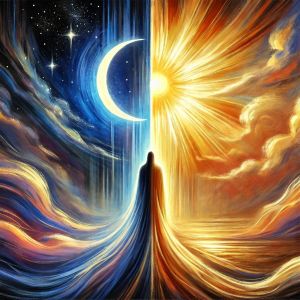Kairos
| Kairos | |
|---|---|
| Image |  |
| Realm | Sataa |
| Aspect | Hourglass, Sundial |
| Osia | Kairosia |
Introduction
Kairos is the spirit of time within the cosmology of Adaris. As the Primordial spirit of time, Kairos controls the flow of moments, ensuring the continuity of all life.
Realm
Kairos established its domain, known as Sataa or the Realm of Time, at the intersection of light and dark. Sataa is unique among the realms as it encompasses all the elemental realms within its boundaries, allowing the flow of time to touch every aspect of existence in Adaris. It serves as the space through which the elemental realms move, creating the cyclical nature of day and night and the progression of life.
Sataa exists as a vast, liminal space, where the boundaries between realms blur and time flows like a river. Within this realm, Kairos governs the celestial movements of the sun and moon, orchestrating the passage of hours and seasons. Sataa is depicted as an ever-changing landscape, filled with shifting sands, flowing rivers, and eternal twilight, representing the constant ebb and flow of time.
While Sataa encompasses all the elemental realms, there are certain domains that lie outside the reach of time. The realms of imagination and consciousness held by Awenlas and Daathir, exist beyond the influence of Kairos. These realms are timeless, not bound by the flow of moments that define Sataa.
Osia
The Osia associated with Kairos involves the manipulation of time. Practitioners align themselves with the flow of time tapping into the consciousness of Kairos and related nascent spirits to influence small temporal events.
While the manipulation of time is inherently limited and localized, affecting small-scale phenomena over short periods, there are legends of those who have attempted to exert greater influence over time, with varying degrees of success and danger.
Philosophical Interpretations
Kairos's existence raises profound philosophical questions about the nature of time and its role in the cosmos. Some see Kairos as a benevolent force, guiding the flow of time to ensure balance and order in the universe. Others view it as a neutral observer, indifferent to the events it witnesses, merely keeping the wheels of time turning.